高级算法——第1周非评估作业
原创2024年9月8日大约 5 分钟
非评估任务1:字符串合并
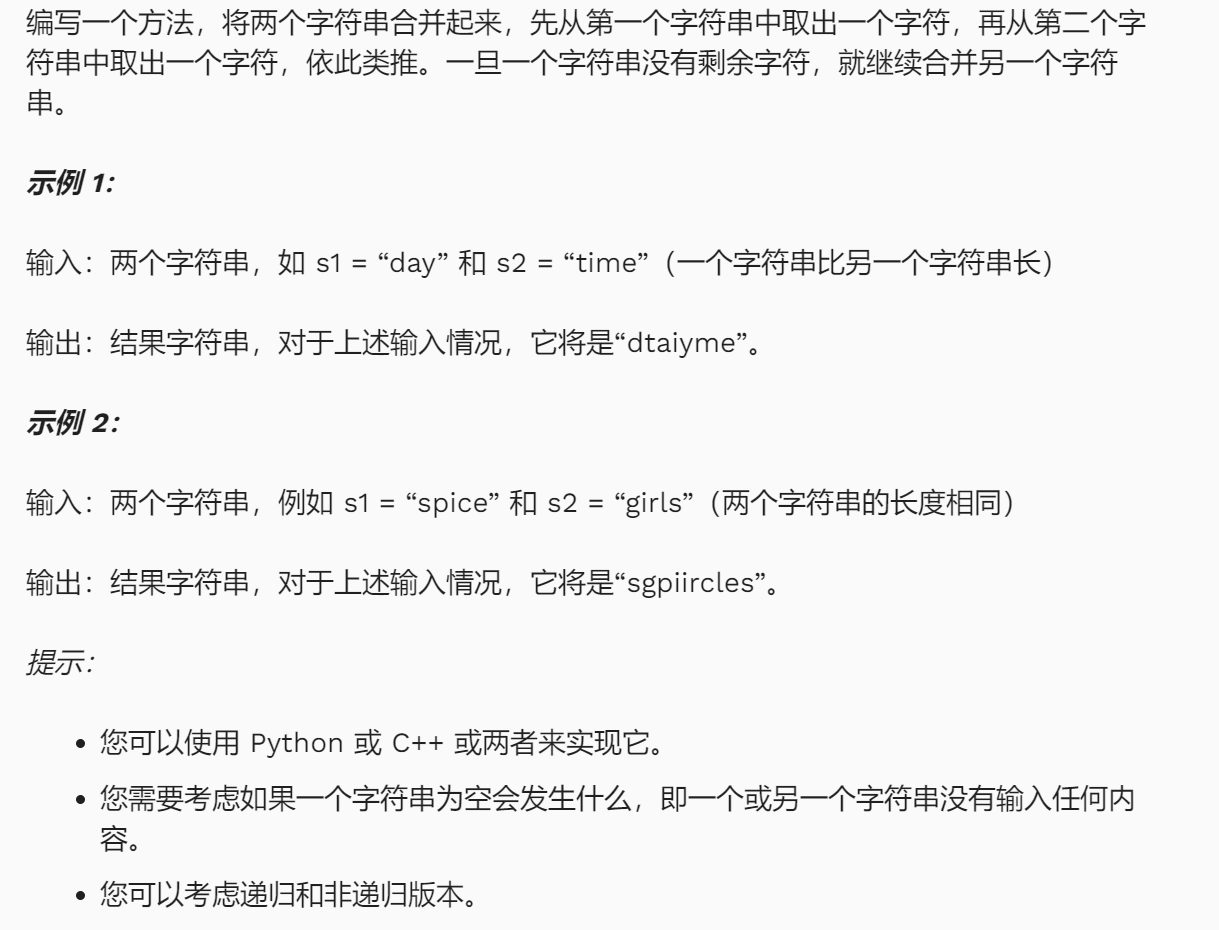
以下代码均为看懂了学校给的代码的逻辑,然后自己重新写出的版本。
Solution 01:非递归版本
string1 = input('Please enter your first string: ')
string2 = input('Please enter your second string:')
len_string1 = len(string1)
len_string2 = len(string2)
new_string = ''
if len_string1 >= len_string2:
limit = len_string2
else:
limit = len_string1
for i in range(limit):
new_string += string1[i]
new_string += string2[i]
if len_string1 >= len_string2:
new_string += string1[limit:len_string1]
else:
new_string += string2[limit:len_string2]
print(new_string)Solution 02 : 递归版本
str1 = input("Enter the first string: ")
str2 = input("Enter the second string: ")
def merge_string(str1, str2):
if not str1:
return str2
elif not str2:
return str1
else:
return str1[0] + str2[0] + merge_string(str1[1:], str2[1:])
print(merge_string(str1, str2))非评估任务2:阿姆斯特朗数字
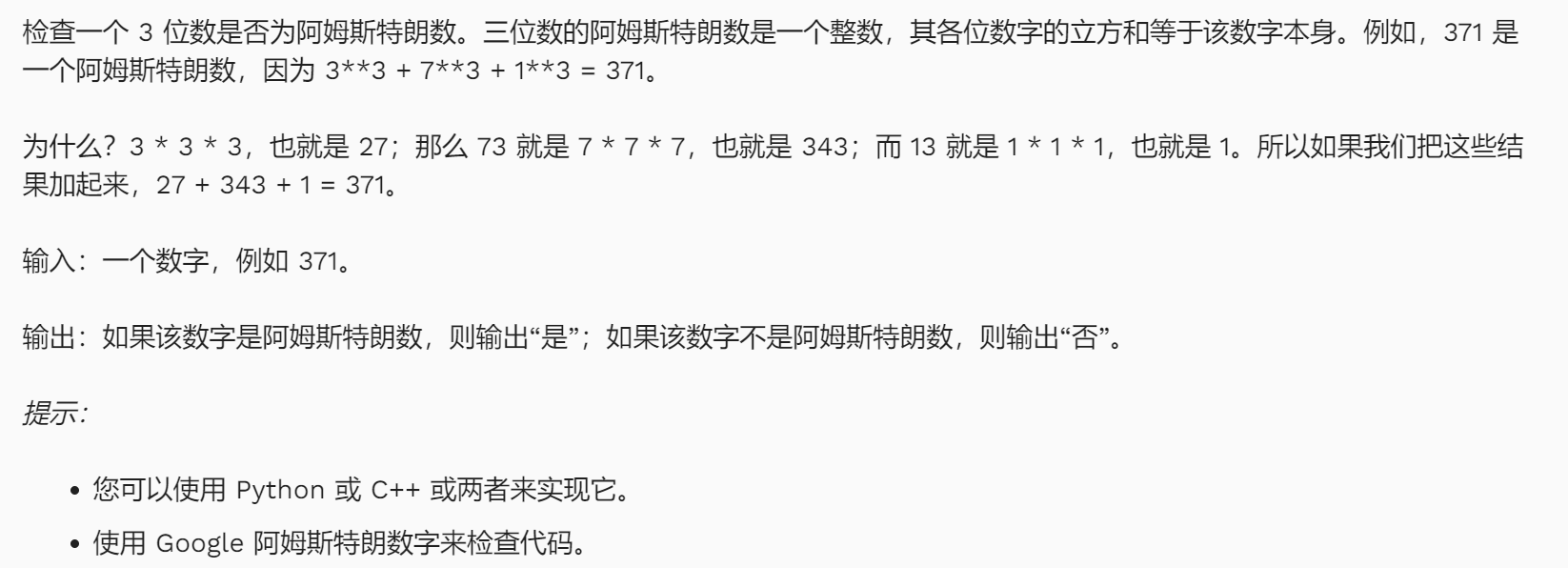
Solution (by myself):
num = input('Enter a integer and check whether it is a Armstrong Numbers or not: ')
h_num = int(num[0])
ten_num = int(num[1])
single_num = int(num[2])
if h_num ** 3 + ten_num ** 3 + single_num ** 3 == int(num):
print('It is an Armstrong Number')
else:
print('It is not an Armstrong Number')Solution (Coventry Given):
#armstrong number if the sum of each digit raised to the power of the total number of digits is equal to the number input
#also works for the task: three-digit numbers only, cubed
def isarmstrong(totest): #input is an integer
toteststr = str(totest) #convert integer to string so it is iterable
res = 0 #declare a variable for result and initialise
for i in range(len(toteststr)): #iterate through each digit
res = res + (int(toteststr[i])**len(toteststr)) #add the digit raised to the power of the length of the number to the result
if res != totest: #if the result is not the same as the number return False and quit
return False
return True #if False was not returned return True - it's an Armstrong number
print(isarmstrong(371))由此意识到自己的问题:输入的数字不一定是一个三位数呀!
Solution (modified):
num = input('Enter a integer and check whether it is a Armstrong Numbers or not: ')
sum = 0
for i in num:
sum += int(i)**3
if sum == int(num):
print('Armstrong Number')
else:
print('Not Armstrong Number')非评估作业 3 : 阶乘是否能被整除?
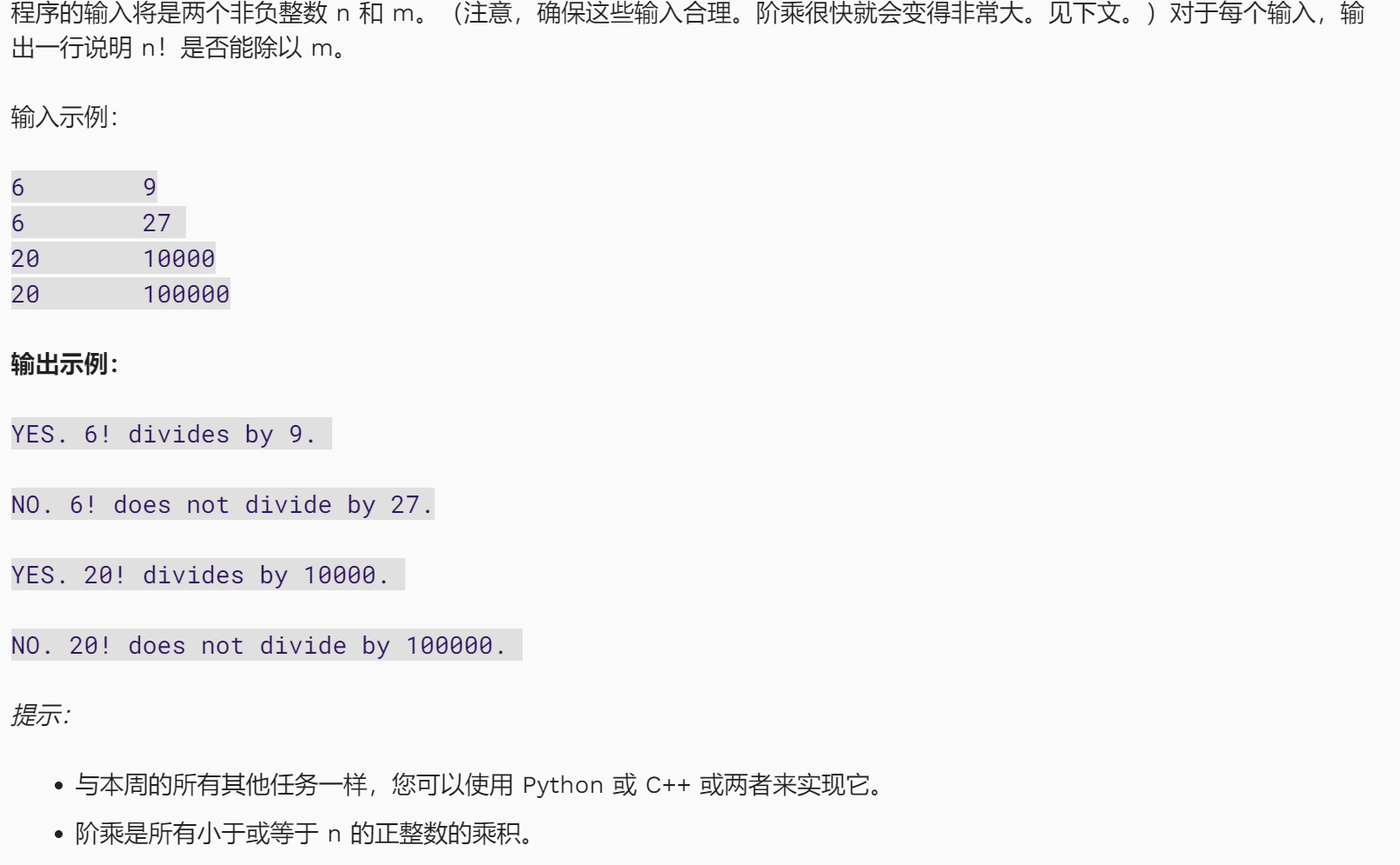
Solution(by myself):
n = input('Enter a number whose factorial you want to calculate:')
m = int(input('Enter a number that you want to be able to calculate whether or not you can divide the factorial of the above numbers:'))
fact_n = 0
for i in range(1,int(n)+1):
fact_n *= i
if fact_n % m == 0:
print(f'Yes, {n}! divides by {m}.')
else:
print(f'No, {n}! does not divide by {m}')Solution(Coventry Given):
def factorial(n):
if (n==0):
return 1
else:
return (n*factorial(n-1))
def does_factorial_divide(fact, divisor):
if factorial (fact) % divisor == 0:
print('YES. %s! divides by %s' % (fact, divisor))
else:
print('NO. %s! does not divide by %s' % (fact, divisor))
#print(factorial(6)) #check the factorial function works
does_factorial_divide(6, 9)函数递归方法。也很值得学习!
Solution(modified):
当我们进行如下测试时,我们发现,我们所写的程序对于计算 数字0 的阶乘时出现 bug:
n = input('Enter a number whose factorial you want to calculate:')
m = int(input('Enter a number that you want to be able to calculate whether or not you can divide the factorial of the above numbers:'))
fact_n = 0
for i in range(1,int(n)+1):
fact_n *= i
print(fact_n)
if fact_n % m == 0:
print(f'Yes, {n}! divides by {m}.')
else:
print(f'No, {n}! does not divide by {m}')
#output
Enter a number whose factorial you want to calculate:0
Enter a number that you want to be able to calculate whether or not you can divide the factorial of the above numbers:1
0
Yes, 0! divides by 1.这个程序计算数字0的阶乘为0 , 而数字0的阶乘为1.
修改:
n = int(input('Enter a number whose factorial you want to calculate:'))
m = int(input('Enter a number that you want to be able to calculate whether or not you can divide the factorial of the above numbers:'))
fact_n = 0
if n == 0:
fact_n = 1
else:
for i in range(1, n+1):
fact_n *= i
if fact_n % m == 0:
print(f'Yes, {n}! divides by {m}.')
else:
print(f'No, {n}! does not divide by {m}')这样就解决问题了。
非评估任务4:满载糖果的卡车
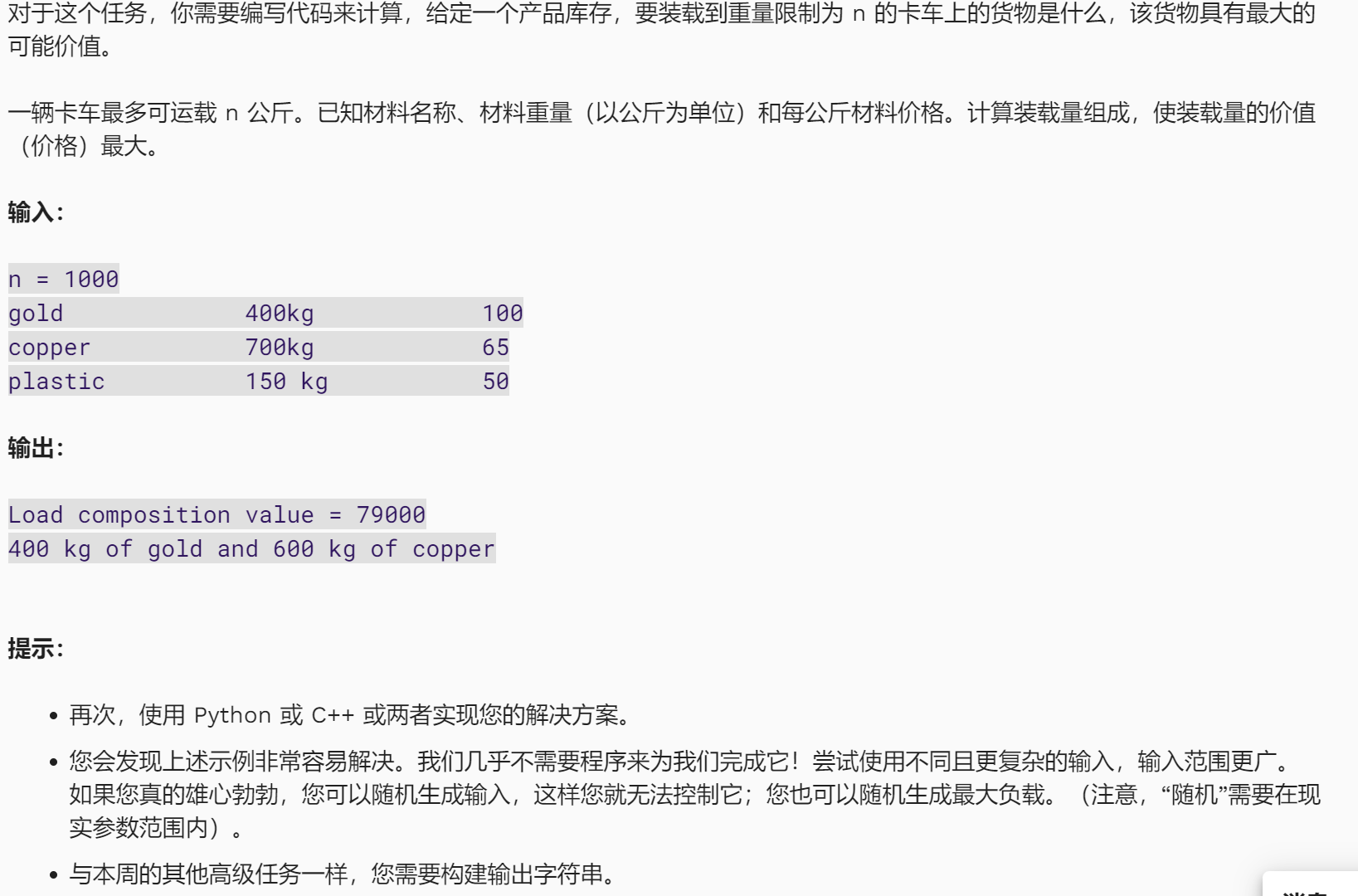
Solution(Coventry Given):
'''
OPTIMAL KNAPSACK ASSUMES ITEMS ARE MULTIPLES OF 1KG ELEMENTS
最优的背包问题假设物品的重量是1kg元素的倍数
'''
# 定义一个函数,用于生成物品的组成
def generate_composition(inventory, weight_limit):
composition = [] # 用于存放物品的每个1kg元素的列表
for item in inventory: # 遍历库存中的每个物品
for i in range(item['weight']): # 根据物品的重量,按1kg为单位添加到composition
composition.append(item)
composition = composition[:weight_limit] # 如果超过了背包的重量限制,则将多余的部分截掉
result = [] # 存储最终物品及其数量
for item in inventory: # 再次遍历库存中的物品
# 计算背包中有多少该物品的元素(1kg为单位)
item['comp_quantity'] = composition.count(item)
if item not in result: # 确保不重复添加物品
result.append(item) # 添加物品到结果列表
return result # 返回物品组成及其在背包中的数量
# 定义生成背包函数
def generate_knapsack(inventory, weight_limit):
if not inventory: # 如果没有提供库存物品
inventory = example_inventory # 使用默认的库存物品
comp = generate_composition(inventory, weight_limit) # 获取最优的背包物品组合
string = '' # 用于构建输出的字符串,告知背包中装了哪些物品
for item in comp: # 遍历组合后的物品
if item['comp_quantity'] > 0: # 如果该物品在背包中数量大于0
string += '{}kg of {}, '.format(
str(item['comp_quantity']), item['name']) # 构建物品的描述字符串
if string: # 如果字符串不为空
string = string[:-2] # 去掉最后的逗号和空格
else:
string = "No materials" # 如果背包里没有物品,返回“No materials”
return 'Robber\'s knapsack contains: %s.' % string # 返回最终字符串,描述背包中的物品
# 主函数,执行逻辑
def main():
# 定义找到的物品,包含物品的名字、重量和价值
found_items = [
{'name': 'Item_1', 'weight': 60, 'value': 60},
{'name': 'Item_2', 'weight': 20, 'price': 100},
{'name': 'Item_3', 'weight': 30, 'price': 120}
]
weight_limit = 50 # 定义背包的重量限制
inventory = found_items # 使用找到的物品作为库存
# 打印出生成的背包内容
print(generate_knapsack(inventory, weight_limit))
# 调用主函数
main()非评估任务5:八皇后
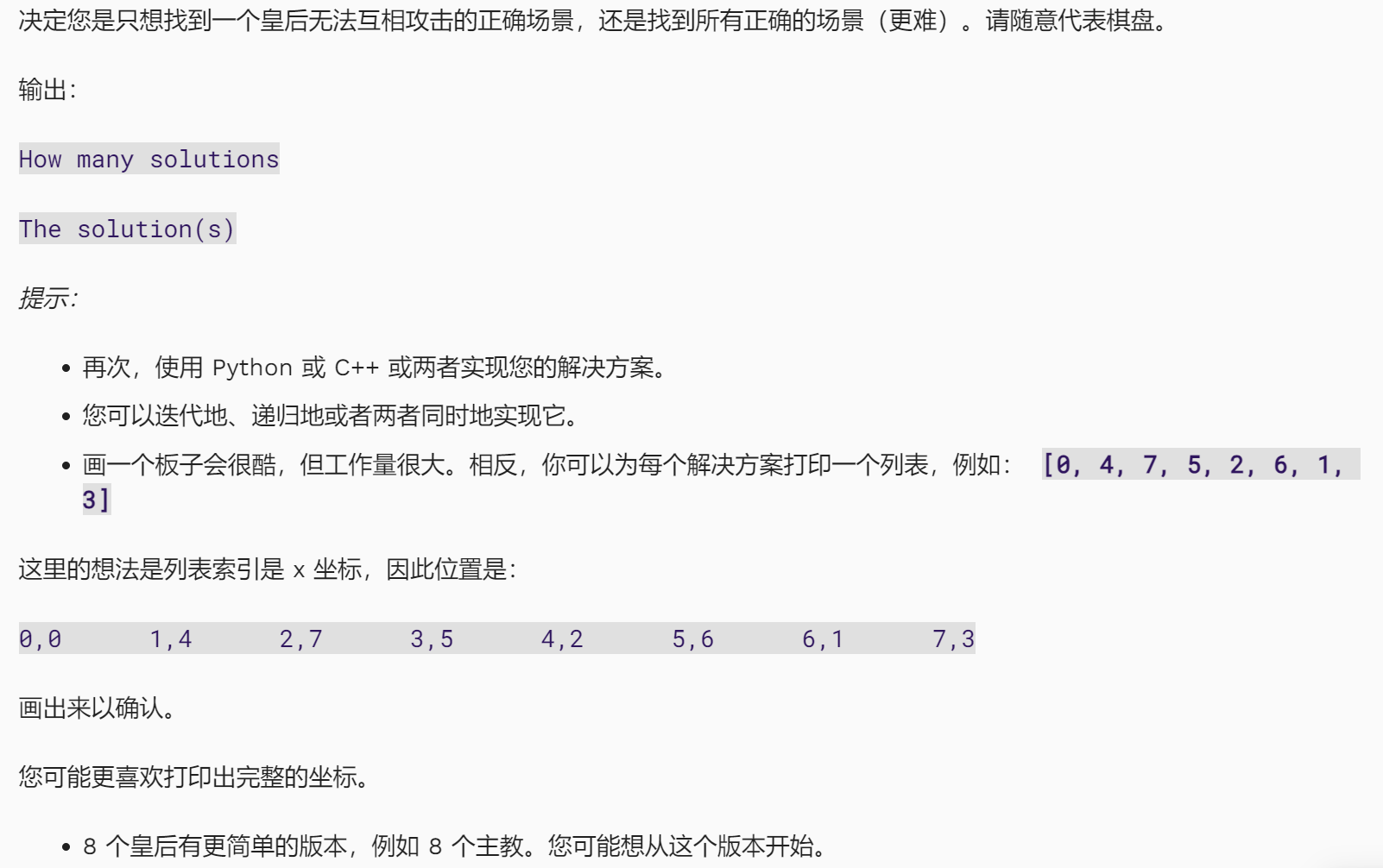
参考链接:https://en.wikipedia.org/wiki/Eight_queens_puzzle
Solution(Coventry Given):
-